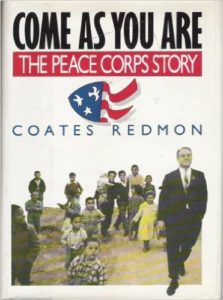# 13 Mad Woman At The Peace Corps: Elizabeth Forsling Harris (Washington, D.C.)
Betty Harris was what we used to call a ‘a piece of work.’ She was thirty-nine-years old in 1961 and had been a political organizer and a public relations executive in Dallas, Texas, before arriving in D.C. She had also been a pioneering journalist in New York City before women had such jobs, working with among others, Newsweek and NBC.
When she arrived at the Peace Corps in 1961 she had just gone through a bitter divorce with Leon Harris, the son of man whose department store in Dallas that became the model of Neiman-Marcus. Betty always, in fact, looked as if she had just stepped out of the pages of a Neiman-Marcus catalog. ‘Chic’ is the term that Coates Redmon uses to describe Betty in Come As You Are.
Betty Harris knew Shriver longer than anyone else at the Peace Corps, having first met the man in the 1940s when  they both worked at Newsweek. Betty would talk about the Shriver she knew back in New York, in Coates Redmon’s book, saying of Shriver, “In the pre-Eunice days every affluent, socially ambitious Catholic–or for that matter, Protestant-family in New York–was after Sarge as a potential husband for their darling daughter. He was considered a great catch. He was incredibly handsome, athletic, bright, well-educated, well-born, amusing, and polite. With all of that going for him, the fact that he had no money didn’t matter. He was invited everywhere. And in the late 1950s, he was rising influence in Chicago politics, a likely candidate for governor, when his political career there was cut short on account of the minor matter of his brother-in-law having been elected president.”
they both worked at Newsweek. Betty would talk about the Shriver she knew back in New York, in Coates Redmon’s book, saying of Shriver, “In the pre-Eunice days every affluent, socially ambitious Catholic–or for that matter, Protestant-family in New York–was after Sarge as a potential husband for their darling daughter. He was considered a great catch. He was incredibly handsome, athletic, bright, well-educated, well-born, amusing, and polite. With all of that going for him, the fact that he had no money didn’t matter. He was invited everywhere. And in the late 1950s, he was rising influence in Chicago politics, a likely candidate for governor, when his political career there was cut short on account of the minor matter of his brother-in-law having been elected president.”
Betty didn’t hear the ‘call of the Peace Corps’ down in Texas due to her divorce proceedings. But then, in that magical way the agency had in those early years of gathering talented people, she traveled to D.C. on business in the summer of ’61 and fate changed her life and the future of the new Peace Corps.
At dinner at the family home of Water Jenkins (remember him?) Betty was pressing Jenkins to have Irving Goldberg, a mutual Dallas friend, appointed to a judgeship. Jenkins said he couldn’t do anything more, that it was up to JFK.
Well, that wasn’t good enough for Betty. She knew Sarge Shriver from the old days in New York, so at 9 p.m. that night, she called the Peace Corps to leave a message for Shriver, and Sarge answered the phone. He was still working at the agency. (This was the way it was done in those first years of the Peace Corps; no one worked nine-to-five.)
After making her case for Irving Goldberg, Shriver told Betty to get him the man’s CV as he was going to Hyannis Port that weekend.
“The next morning,” Betty recalled, “I wrote out Irving’s qualifications on a piece of Mayflower Hotel stationery [yes, the famous Peace Corps Mayflower Hotel] and walked the four blocks to the Peace Corps and ran into Sarge on the street. He was returning to work after lunch.”
Sarge naturally asked about her husband.
“Well, he isn’t, Sarge. I mean, we are getting a divorce.”
“Fine, so why don’t you come to work for the Peace Corps?”
Betty said she couldn’t.
“Well, let’s talk about this over dinner.”
That night at the old La Salle du Bois, on Connecticut Avenue, Sarge talked and talked Peace Corps and again the next day at lunch with Larry Dennis, the first associate director of the Office of Peace Corps Volunteers. They both talked and talked Peace Corps.
Betty, it was decided over lunch, would be head of the Women’s Division at the Peace Corps. At the time there was, of course, no such thing as a Women’s Division in the government, but this was the Peace Corps, Betty thought. Perhaps the New Frontier and JFK would establish a Women’s Division to promote women, which was one of Betty’s passions. Yes, she would burn her Texas bridges and move to DC.
The Women’s Division never happened at the Peace Corps and soon (very soon) Betty Harris learned how disorganized the agency was, and why women weren’t sitting at the conference table with the Mad Men.
However, once Betty Forsling Harris arrived in D.C., all of that would change at the Peace Corps.
No comments yet.
Add your comment